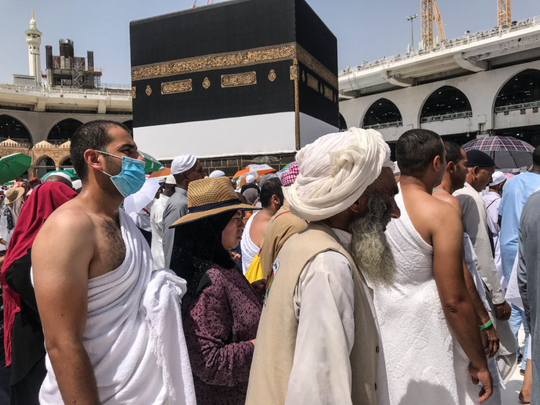
Many people who have committed to perform Haj this year — the most arduous requirement for Muslims — are preparing for the task. Many Muslims save and plan extensively for this journey, while others make the pilgrimage more than once if they are able to.
The requirements for performing the pilgrimage are as follows:
n They must have maturity and a sound mind, in order to understand the significance of the pilgrimage experience;
n They must have the physical capability to travel and perform the pilgrimage rites;
n They must demonstrate financial stability, be free of debt, so that they are able to bear the expenses of the pilgrimage, as well as provide for their dependents during travel.
For those who meet these criteria, performing the pilgrimage is obligatory at least once in their lifetime. To combat the rising prices of performing Haj, The Haj Ministry in Saudi Arabia had announced in 2013 that it had licensed 22 companies to provide low-cost Haj services to domestic pilgrims, including expatriates. “These companies will charge 1,900 (Dh1,860) to 3,900 Saudi riyal as part of the Muyaser Programme,” it said, adding that such services would cover 20 per cent of domestic pilgrims. The ministry at the time said it was encouraging Haj companies to provide low-cost services to meet the requirements of a large number of Saudis and expatriates who could ill-afford the exorbitant prices charged by some operators, by providing incentives such as increasing the number of pilgrims they serve.
“They are also given priority in tent allocations in Mina,” a ministry official said. Moreover, they are allowed to rent 70 per cent of the buses from foreign companies at competitive prices.
However, many are still finding it hard to pin down Haj operators who are refusing to abide by the ministry’s rules. One local resident told me that he had been trying to register with the low-cost Haj scheme sponsored by the ministry through the internet since last year, but unfortunately, he hadn’t succeeded. The Muyaser website apparently only displayed the normal costs and not the discounted ones — an apparent bureaucratic oversight. He questioned whether it was some type of joke on low-income people or were the low-cost slots had been distributed even before the website went online?
Another resident, an expat, wanted to perform Haj as he was sending his family back home and wondered if this would be his last Haj as well. He said: “Due to rise in rents and other items, including family fees, I was planning to send the family back, but before that I wanted to avail the opportunity of doing Haj while in Saudi Arabia. I don’t know for how long my services will be needed here and I wanted badly to perform Haj this year as it could be my last [in Saudi Arabia]. There are many more like me, wondering what to do. Once we go back to our country it would be impossible to return and perform Haj due to high travel costs.”
While the government has taken the initiative to lay down rules and regulations to accommodate low-income domestic pilgrims, the strict monitoring that is required to ensure that such rules are adhered to has unfortunately been missing.
Haj operators have raised prices atrociously, leaving many lower-income people out of the pilgrimage arena. The official website dedicated to supporting individuals and families who could not afford to eke out a fortune to perform one of Islam’s basic pillars apparently falls short of expectations, leaving many dreams unrealised.
While all other organs of the government are working overtime to ensure a smooth and safe passage of this year’s Haj, the Haj Ministry in Saudi Arabia should ensure fair prices and prevent Haj from becoming just yet another business venture for greedy operators.
Tariq A. Al Maeena is a Saudi socio-political commentator. He lives in Jeddah, Saudi Arabia. Twitter: @talmaeena.









